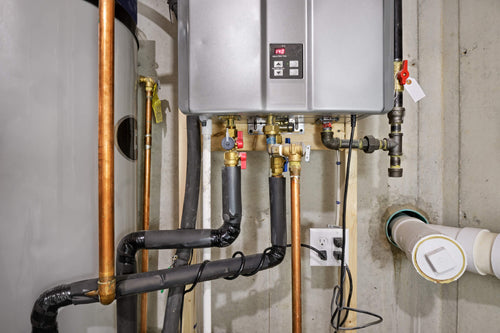The publisher is making a few great pointers about Pros and Cons of Tankless Water Heater in general in the article further down.

In a globe where convenience and efficiency reign supreme, it's no surprise that homeowners are continuously in search of smarter methods to manage their home's power consumption and comfort. One innovation that has actually steadily obtained popularity is the tankless hot water heater. Yet what exactly makes these systems stick out from the traditional tank-based designs most of us grew up with? Allow's dive in and explore the advantages of tankless hot water heater, helping you choose if it's time to make the button in your home.
Introduction
Image this: you enter the shower after a long day, expecting a relaxing cascade of warm water, just to be greeted by icy droplets since the last individual utilized it all up. Sound acquainted? Conventional hot water heater keep a set quantity of warm water, meaning you're at the mercy of that storage tank's supply. Tankless systems, on the other hand, heat water as needed. Say goodbye to running out mid-shower, say goodbye to fumbling with routines simply to make sure hot water is available.
Understanding Tankless Water Heaters
What Are Tankless Hot Water Heater?
Tankless water heaters, in some cases referred to as on-demand or instant water heaters, offer warm water just as it's needed. As opposed to saving gallons of pre-heated water, these systems kick right into action the moment you switch on the tap. Water passes through a warmth exchanger, heating up in real-time, suggesting you obtain a continuous flow of warm water without the requirement for a big tank sitting lazily by.
How Do They Differ from Conventional Equipments?
Typical heating systems hold a tank of warm water, using energy to keep that tank at a constant temperature. Tankless devices eliminate the standing supply, lowering wasted energy and the large impact of a huge cyndrical tube. Basically, you're upgrading from a "accumulation" attitude to a "made-to-order" method.
Common Kinds Of Tankless Units
Tankless water heaters typically come in 2 varieties: gas and electric. Gas models tend to supply greater circulation prices, ideal for larger families, while electrical models often offer smaller sized homes and are usually much easier to set up. Furthermore, some systems are made for point-of-use (offering one fixture) while others can deal with the whole home's warm water requirements.
Trick Advantages of Tankless Water Heaters
Power Performance and Cost Financial Savings
No more heating up a titan container's worth of water and keeping it warm all day. Tankless heaters minimize standby power losses, which can lower energy expenses. While the initial expense could be higher, the long-lasting financial savings typically validate the financial investment.
3. Space-Saving Layout
If your home is short on storage space, getting rid of the cumbersome container frees up valuable area. Tankless units are portable and can typically be installed on walls, stashed in corners, or installed in tight energy wardrobes without monopolizing the whole room.
4. Longer Life expectancy
A well-kept tankless water heater can outlive its tank-based relative. Typical storage tanks might last 10-15 years, while tankless designs can maintain chugging along for twenty years or more, making them a solid financial investment in time.
1. Countless Hot Water Supply
Ever before had to arrange showers so every person gets their reasonable share of warm water? With tankless, that comes to be a distant memory. As long as the heating system's circulation ability isn't exceeded, you can take back-to-back showers without developing into a popsicle.
5. Improved Water Quality
Keeping water in a storage tank can occasionally cause debris buildup or a somewhat "off" preference. With tankless systems, fresh water is heated up right away, lowering the possibilities of debris buildup and possibly providing cleaner-tasting water.
Factors to consider Prior To Changing
Though the benefits are engaging, it's smart to think about a couple of elements before completely dedicating.
Assessing Your Home's Water Usage Patterns
If your home at the same time makes use of numerous components with high hot water demand, make certain the unit's flow rate meets your demands. Recognizing your usage patterns helps you choose the best size and type of tankless heating unit.
Maintenance and Treatment Tips
Tankless systems are relatively reduced upkeep, but they aren't set-it-and-forget-it devices.
Regular Cleansing and Descaling
Hard water minerals can develop in the heat exchanger, affecting performance. Regular descaling (usually recommended annually) keeps the system running at peak performance.
Annual Professional Assessments
A yearly checkup from a specialist guarantees small issues are caught early. They'll analyze the system's performance, seek leaks, and assist maintain ideal efficiency.
Preliminary Financial Investment Expenses
Tankless heating systems commonly include a higher ahead of time price tag. Between the unit itself and potential setup adjustments, the preliminary expense may provide you sticker shock. But remember to watch it as a long-lasting financial investment.
Setup Demands
Depending upon your home's infrastructure, you could need extra electrical capacity or gas line upgrades. Guarantee you understand the setup needs and consult with a professional to avoid surprises.
Ensuring Appropriate Ventilation
For gas versions, correct ventilation is important to safely expel exhaust gases. See to it venting systems are tidy and correctly set up to avoid any type of possible safety and security dangers.
Comparing Different Brands and Versions
Not all tankless water heaters are developed equal.
Researching Dependable Manufacturers
Seek trustworthy brands with a history of creating top quality units. A reliable manufacturer typically gives better customer support and longer service warranties.
Installment: DIY or Specialist?
While some homeowners delight in dealing with projects themselves, tankless installation might not be the best time to burst out the tool kit.
Pros and Cons of Do It Yourself Setup
A DIY install can save cash, but it includes risks. Incorrect setup can bring about inefficiency or safety and security worries. If you come in handy and have experience, it might be viable-- however wage caution.
Reviewing Evaluations and Individual Responses
User reviews and comments from neighbors or close friends who have gone tankless can use beneficial understandings. Often, real-life experiences can be a lot more informing than advertising pamphlets.
When to Call a Professional Plumbing Professional
For the majority of, calling a professional makes sure every little thing's done properly. A professional plumber recognizes regional codes, sizing needs, and venting parameters, lowering the danger of problems.
Making the most of Performance
You've invested in a tankless device-- currently maximize its performance.
Ideal Temperature Level Setups
Most individuals establish their devices between 120-140 F. Changing the temperature level can boost convenience and savings. Experiment to locate a sweet spot that does not waste energy.
Coupling With Low-Flow Fixtures
Intend to stretch your system's abilities? Consider mounting low-flow showerheads and taps. They reduce water use, enabling your tankless system to provide a steady stream of warm water without stressing.
Environmental Effect
Tankless hot water heater align with greener living objectives.
Reduced Carbon Footprint
By utilizing less energy and only heating water as required, tankless systems can decrease your home's carbon footprint, decreasing your ecological impact.
Saving Natural Resources
Less power intake and much less thrown away hot water equate right into less natural deposits being utilized, an ecological win-win.
That Profits The Majority Of from Tankless Heating systems?
The beauty of tankless heating systems is that they can match a selection of families.
Big Households vs. Single Passengers
Large households could enjoy the endless hot water supply, while solitary owners value the power savings from not heating an entire container for just one person's early morning shower.
Home Owners with Restricted Room
If your home is short on square video footage, shedding the bulky container frees up space for various other fundamentals-- or possibly just more elbow room.
Eco-Conscious Customers
Going tankless aligns with eco-friendly values, guaranteeing you're not throwing away power or sources.
Future Trends in Tankless Water Heaters
The world of home appliances is ever-evolving, and tankless hot water heater are no exception.
Developments in Innovation
R&D is frequently boosting warmth exchangers, making devices more reliable and long lasting. Future versions may be even quieter, a lot more compact, and much better fit for differing environments.
Smart Home Combination
Visualize readjusting your water heater's temperature via an application or getting maintenance alerts on your phone. As smart home technology breakthroughs, we'll see more connection and comfort.
Conclusion
Picking a tankless water heater is more than simply upgrading your home's warm water system; it's investing in lasting convenience, power performance, and a greener way of life. By considering your house's water usage, being mindful of installment demands, and devoting to regular maintenance, you can take pleasure in a steady stream of hot water without the baggage of a bulky tank. As innovation progresses, you can expect also smarter, extra reliable tankless options that not only make your life much easier yet also benefit the planet.
Why You Should Consider a Tankless Water Heater for Your Home
Energy Efficiency and Cost Savings
Tankless water heaters, also known as on-demand water heaters, heat water only when needed. This means they don't waste energy keeping a tank of water hot constantly. This efficiency translates into substantial cost savings on your monthly energy bills.
Endless Hot Water Supply
One of the significant advantages of tankless water heaters is their ability to provide a continuous supply of hot water. Traditional tank water heaters have a limited capacity and can run out of hot water, especially during peak usage times. In contrast, tankless water heaters can provide an endless stream of hot water, making them ideal for larger families or homes with high water usage.
Space-Saving Design
Tankless water heaters are compact and take up significantly less space compared to traditional tank heaters. They can be installed on walls, under cabinets, or even outside, freeing up valuable space in your home. This makes tankless water heaters a great option for smaller homes or properties with limited space for a traditional water heater.
Longer Lifespan and Lower Maintenance
Tankless water heaters typically have a longer lifespan compared to traditional tank heaters. They can last up to 20 years or more with proper maintenance. Additionally, tankless systems are designed with replaceable parts, which can extend their lifespan further and reduce long-term maintenance costs.
Environmentally Friendly
Reducing energy consumption not only saves you money but also benefits the environment. Tankless water heaters contribute to a smaller carbon footprint by using less energy to heat water. Their energy efficiency and ability to minimize standby heat loss make them an eco-friendly choice for environmentally conscious homeowners.
Customized Temperature Control
Tankless water heaters offer precise temperature control, allowing you to set the desired temperature to meet your specific needs. This level of customization ensures you always have water at the perfect temperature for your comfort and usage requirements.
https://beantownservices.com/blog/consider-tankless-water-heater-for-your-home

We hope you enjoyed our post about Six Benefits of a Tankless Hot Water Heater. Thank you so much for taking a few minutes to read our blog post. Do you know about somebody who is very much interested in the topic? Please feel free to promote it. Thank-you for your time spent reading it.
Click Here